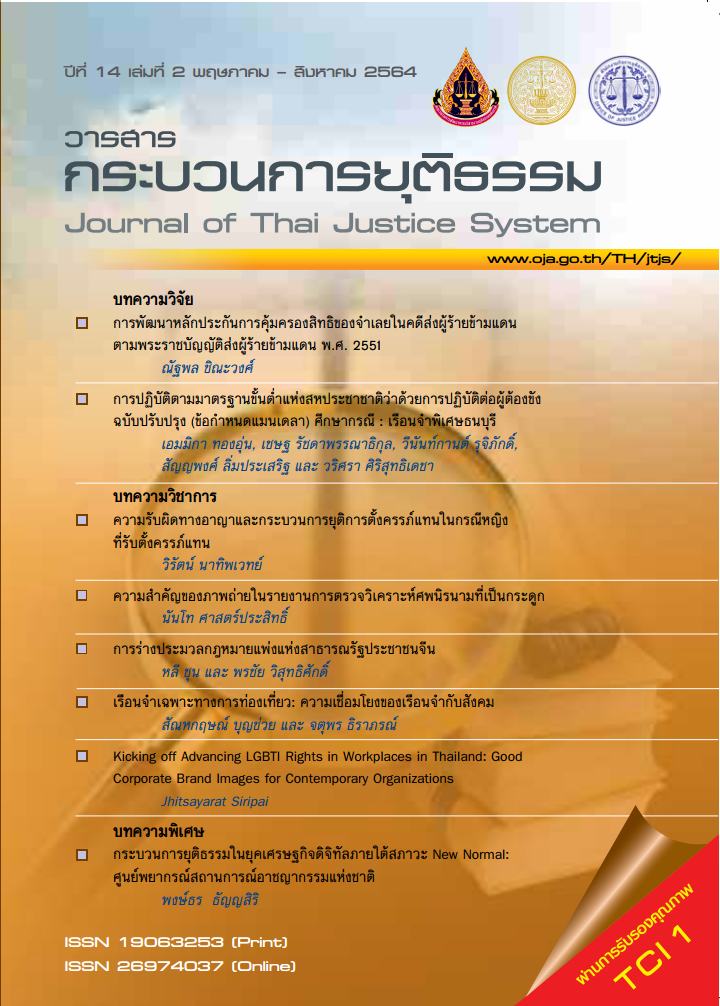การร่างประมวลกฎหมายแพ่งแห่งสาธารณรัฐประชาชนจีน
Main Article Content
บทคัดย่อ
การประกาศใช้ประมวลกฎหมายแพ่งถือเป็นขั้นตอนใหม่ของการพัฒนากฎหมายแพ่งของจีน การเริ่มร่างประมวลกฎหมายแพ่งที่ในปี พ.ศ. 2557 เป็นมาตรการสำคัญในการปรับปรุงระบบกฎหมายที่มีเอกลักษณ์แบบจีน นอกจากนี้ยังใช้กลยุทธ์ "การเตรียมงานสองขั้นตอน" ในการร่างประมวลกฎหมายแพ่ง ซึ่งเป็นการร่าง “กฎหมายทางแพ่งแต่ละประเภท” ก่อน หลังจากนั้นรวบรวมเป็น “ประมวลกฎหมายแพ่ง” การร่างประมวลกฎหมายแพ่งจีนมีลักษณะพิเศษที่สำคัญ 5 ประการ ดังนี้ ยึดแนวทางการเมืองที่ถูกต้อง ยึดประชาชนเป็นศูนย์กลาง ยึดสถานการณ์และลักษณะพิเศษของประเทศ ยึดมั่นในการปกครองประเทศตามกฎหมายและกฎแห่งคุณธรรม และยึดมั่นในหลักการวิทยาศาสตร์และประชาธิปไตย ลักษณะพิเศษเหล่านี้แสดงให้เห็นว่าประมวลกฎหมายแพ่งของจีนไม่เพียงแต่สะท้อนจิตวิญญาณของยุคสมัย แต่ยังตอบสนองความต้องการของยุคสมัยและยังช่วยแก้ปัญหาในทางปฏิบัติได้อีกด้วย ไม่เพียงแต่ทำให้ระบบเศรษฐกิจการตลาดพัฒนาและวางระเบียบรากฐานที่มั่นคงกับเศรษฐกิจการตลาด ซึ่งจะเป็นหลักประกันที่แข็งแกร่งสำหรับการริเริ่มใหม่ของเศรษฐกิจของจีน ความเจริญรุ่งเรืองทางวัฒนธรรม ความสงบสุขของสังคม นอกจากนี้ยังเป็นการให้ข้อมูลอ้างอิงที่เป็นประโยชน์ต่อการร่างระบบประมวลกฎหมายแพ่งในประเทศอื่นๆ
Article Details

อนุญาตภายใต้เงื่อนไข Creative Commons Attribution-NonCommercial-NoDerivatives 4.0 International License.
ต้นฉบับที่ได้รับการตีพิมพ์ในวารสาร เป็นลิขสิทธิ์ของวารสารกระบวนการยุติธรรม แต่ความคิดเห็นที่ปรากฏในเนื้อหาของบทความในวารสารกระบวนการยุติธรรม ถือเป็นความรับผิดชอบของผู้เขียนแต่เพียงผู้เดียว
เอกสารอ้างอิง
จาง โหย่วหยู. (2529). เหตุใดจึงต้องมีการร่างหลักทั่วไปของกฎหมายแพ่ง. วารสารกฎหมายจีน, 4. 3-10.
เย่ รู๋ถัง. (2537). “คำอธิบายเกี่ยวกับกฎหมายของสาธารณรัฐประชาชนจีนว่าด้วยการจัดการอสังหาริมทรัพย์ในเมือง ฉบับร่าง”. ใน การประชุมคณะกรรมการประจำสภาประชาชนแห่งชาติ ชุดที่ 8 ครั้งที่ 7. ปักกิ่ง: ผู้แต่ง.
วัง ฮันบิน. (2529). คำอธิบายเกี่ยวกับหลักทั่วไปของกฎหมายแพ่งของสาธารณรัฐประชาชนจีน ฉบับร่าง. ใน การประชุมสภาประชาชนแห่งชาติ ชุดที่ 6 ครั้งที่ 4. ปักกิ่ง: ผู้แต่ง.
สู จ้วน. (28 สิงหาคม 2561). การส่งร่างประมวลกฎหมายแพ่งเพื่อพิจารณาเป็นครั้งแรก. หนังสือพิมพ์เหรินหมินรื่อเป้า ฉบับที่ 6.
หยาง ลี่ซิน. (2547). ปัญหาความขัดแย้งในกฎหมายแพ่งและพาณิชย์: ค่าสินไหมทดแทนทางด้านความเสียหายทางจิตใจ. ปักกิ่ง: สำนักพิมพ์มหาวิทยาลัยเหรินหมิน.
หวัง ห่ายหมิง. (2541). ทฤษฎีใหม่แห่งความเท่าเทียม. สังคมศาสตร์จีน, 5, 52-68.
เหยาหง. (2550). กฎหมายทรัพย์สินของสาธารณรัฐประชาชนจีน. ปักกิ่ง: สำนักพิมพ์ประชาชน.
จี๋หลิน เหรินต้า. (2562). การร่างประมวลกฎหมายแพ่งในยุคใหม่. สำนักงานกฎหมายแพ่งของคณะกรรมการกิจการนิติบัญญัติของคณะกรรมาธิการสภาผู้แทนประชาชนแห่งชาติ, 1. 25-29.
Hoshino, E. (2555). ประเด็นพื้นฐานของกฎหมายแพ่งสมัยใหม่. เซี่ยงไฮ้: สำนักพิมพ์ซานเหลียน.
Pompand, P. (2535). ตำรากฎหมายโรมัน. ปักกิ่ง: สำนักพิมพ์มหาวิทยาลัยรัฐศาสตร์และกฎหมายแห่งประเทศจีน.
Rudolf von Jhering. (2562). การต่อสู้เพื่อสิทธิ. ปักกิ่ง: สำนักพิมพ์กฎหมาย.


